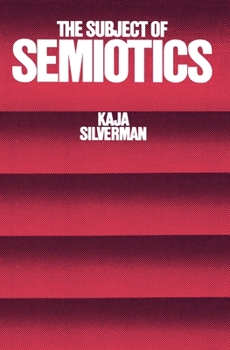The Subject of Semiotics
Select Format
Select Condition 
Book Overview
This provocative book undertakes a new and challenging reading of recent semiotic and structuralist theory, arguing that films, novels, and poems cannot be studied in isolation from their viewers and readers.
Format:Paperback
Language:English
ISBN:0195031784
ISBN13:9780195031782
Release Date:August 1985
Publisher:Oxford University Press
Length:320 Pages
Weight:0.78 lbs.
Dimensions:0.7" x 5.3" x 8.0"
Customer Reviews
4 ratings
Kaja's Kase
Published by Thriftbooks.com User , 17 years ago
Kaja Silverman does an excellent job of describing the history and philosophy behind semiotics. She has a compendium of knowledge about the many pioneers of semiotics and summurizes each individuals contribution, such as Derrida, Saussure, and Barthes. Like Josheph Campbell ("The Hero with a Thousand Faces"), Silverman focuses on psycoanalysis and Freudian thought to help solidify semiotics as a modern form of literary criticism. For anyone interested in semiotics or just wanting to get a general view of how this discipline can be utilized in literature, film, and popular culture "The Subject of Semiotics" is the perfect place to explore.
Brilliant, but use with caution
Published by Thriftbooks.com User , 22 years ago
In many respects Silverman's _Subject of Semiotics_ is a brilliant introductory work to post-structuralist approaches to semiotics. First, Silverman's style of exposition is exceedingly clear and provides numerous examples from literature and film to support her claims and aid the reader in discerning how structuralist principles can be applied. Moreover, Silverman displays extensive knowledge of both structural linguistics and Freudian psychoanalysis. If the book limited itself to Freud and structuralism I would unhesitatingly give it four stars, however Silverman's presentation of Lacan suffers from serious misrepresentations. For instance, in reference to Plato's myth of the three sexes, Silverman writes, "One of these assumptions [that Lacan shares with Plato] is that the human subject derives from an original whole which was divided in half, and taht its existence is dominated by the desire to recover its missing compliment. Another of these assumptions is that the division suffered by the subject was sexual in nature-- that when it was "sliced" in half, it lost the sexual androgyny it once had and was reduced to the biological dimension either of a man or a woman. This biological dimension is seen by Lacan, if not by Plato, as absolutely determining the subject's social identity. Finally, Lacan shares with Aristophanes the belief that the only resolution to the loss suffered by the subject as the consequence of sexual division is heterosexual union and procreation" (152). For those familiar with the work of Lacan, these claims are absurd. While it is true that Lacan argues that we spend our entire life looking for that missing piece of ourselves, nowhere does Lacan claim that this lack results due to biology. Moreover, for Lacan the differentiation of the sexes is not a biological fact, but a cultural fact. Finally, Lacan claims that "there is no sexual relationship", thus effectively undermining the suggestion that he believes that heterosexual love is the solution to our malaise. Now, I do not feel that Silverman is to be blamed for the assertions she here makes. _The Subject of Semiotics_ was written in 1983, when many of Lacan's seminars-- notably seminar XX on feminine sexuality --were not yet available. Consequently, there is a great deal about Lacan that she could not have known. However, in the case of a text as important as Silverman's for introductory purposes, one would expect that new editions would be written correcting claims that are blatantly false and misleading. Silverman's text is careful and thorough, yet it is important to read the materials with which she is working and not rely on her analyses as completely authorative.
Making Sense of Semiotics
Published by Thriftbooks.com User , 23 years ago
To the unititiated, the world of semiotics can be daunting. Silverman's book can help. Though not an easy read for those unfamiliar with structuralism, post-structuralism and post-modern thought, the author presents the history and ideas of the most important contributers in the field. One should not, however, take her interpretations as the final word on the authors whose work she describes and interprets. Read Silverman, read the primary sources, compare, and make your own decisions. This book is absolutely necessary to those who would understand the likes of Saussure and Lacan.
A Must-Have for students of theory
Published by Thriftbooks.com User , 25 years ago
Extremely useful for the student attempting to learn about Jacques Lacan, Roland Barthes, et. al. especially for the cinema student. I credit this book with getting me through several grad school film theory courses!






